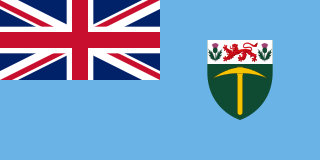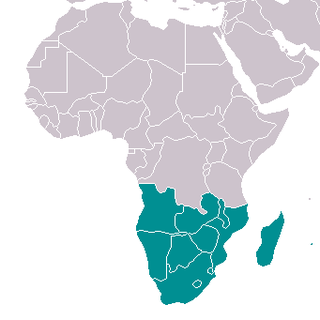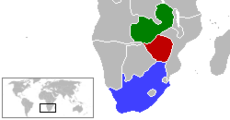
Rhodesia, officially from 1970 the Republic of Rhodesia, was an unrecognised state in Southern Africa from 1965 to 1979. During this fourteen-year period, Rhodesia served as the de facto successor state to the British colony of Southern Rhodesia, and in 1980 it became modern day Zimbabwe.

Southern Rhodesia was a landlocked, self-governing British Crown colony in Southern Africa, established in 1923 and consisting of British South Africa Company (BSAC) territories lying south of the Zambezi River. The region was informally known as South Zambesia until annexation by Britain, at the behest of Cecil Rhodes's British South Africa Company. The bounding territories were Bechuanaland (Botswana), Northern Rhodesia (Zambia), Portuguese Mozambique (Mozambique) and the Transvaal Republic.

Zimbabwe-Rhodesia, alternatively known as Zimbabwe Rhodesia, also informally known as Zimbabwe or Rhodesia, was a short-lived sovereign state that existed from 1 June 1979 to 18 April 1980, though it lacked international recognition. Zimbabwe Rhodesia was preceded by another state named the Republic of Rhodesia and was briefly under a British-supervised transitional government sometimes referred to as a reestablished Southern Rhodesia, which according to British constitutional theory had remained the lawful government in the area after Unilateral Declaration of Independence (UDI) in 1965. Following the 1980 Southern Rhodesian general election, the country was granted internationally-recognized independence within the Commonwealth as the Republic of Zimbabwe.

The Rhodesian Bush War, also known as the Rhodesian Civil War, Second Chimurenga as well as the Zimbabwe War of Independence, was a civil conflict from July 1964 to December 1979 in the unrecognised country of Rhodesia.

The Internal Settlement was an agreement which was signed on 3 March 1978 between Prime Minister of Rhodesia Ian Smith and the moderate African nationalist leaders comprising Bishop Abel Muzorewa, Ndabaningi Sithole and Senator Chief Jeremiah Chirau. After almost 15 years of the Rhodesian Bush War, and under pressure from the sanctions placed on Rhodesia by the international community, and political pressure from South Africa, the United Kingdom, and the United States, the Rhodesian government met with some of the internally based moderate African nationalist leaders in order to reach an agreement on the political future for the country.

The history of Rhodesia from 1965 to 1979 covers Rhodesia's time as a state unrecognised by the international community following the predominantly white minority government's Unilateral Declaration of Independence on 11 November 1965. Headed by Prime Minister Ian Smith, the Rhodesian Front remained in government until 1 June 1979, when the country was reconstituted as Zimbabwe Rhodesia.
United Nations Security Council Resolution 253, adopted unanimously on May 29, 1968, after reaffirming previous resolutions, the Council noted with concern that the measures taken so far have failed to bring the rebellion in Southern Rhodesia to an end and condemned the recent "inhuman executions carried out by the illegal regime in Southern Rhodesia which have flagrantly affronted the conscience of mankind". After further condemning the regime and calling upon the United Kingdom to end the rebellion in Southern Rhodesia the Council decided that all member states would:
During the 1960s, many independence movements emerged in countries near Rhodesia, which had significant effects on political affairs and social conditions within Rhodesia.
United Nations Security Council Resolution 326, adopted on February 2, 1973, concerned with provocative and aggressive acts committed by Rhodesia against Zambia and disturbed by the continued military intervention of South Africa in Rhodesia, the Council condemned all acts of provocation and harassment against Zambia.
United Nations Security Council Resolution 327, adopted on February 2, 1973, reaffirmed previous resolutions on the topic of Rhodesia and commended Zambia for its decision to immediately enforce sanctions. The United Nations plan to crush the Rhodesian government relied heavily on sanctions, Zambia had decided to enforce the sanctions when other nations chose not to despite the large impact the cessation of trade with Rhodesia would have on the Zambian economy. The Council decided to send the special mission established by resolution 326 to assess the needs of Zambia in maintaining alternate forms of communication and traffic, as most of it had flowed through Rhodesia in the past.
United Nations Security Council Resolution 333, adopted on May 22, 1973, after reiterating previous statements and admitting that previous measures had yet failed to bring about the end of the "illegal regime in Southern Rhodesia" the Council condemned South Africa and Portugal for failing to co-operate with the implementation of sanctions and requested that urgent action be taken to implement them. The Council then requested that states with legislation permitting importation from Rhodesia repeal it immediately and called upon states to enact and enforce legislation against any person who tries to evade of commit a breach of sanctions by:
United Nations Security Council Resolution 409, adopted on May 27, 1977, reaffirmed the Council's previous resolutions and affirmed that the policies created by them would remain in place. The Council, acting under Chapter VII, further decided that all member states should prohibit the use of funds in their territory from use by Rhodesia and/or Rhodesian citizens, save for pensions. The Resolution also decided that the Committee established in Resolution 253 (1968) should examine possible uses of Article 41 of the Charter of the United Nations.

In United Nations Security Council Resolution 423, adopted on March 14, 1978, after recalling its resolutions on Southern Rhodesia, particularly 415 (1977), the Council condemned attempts by the "illegal racist regime" in Southern Rhodesia to retain power and prevent the independence of Zimbabwe. It also criticised the country's executions of political prisoners and actions against neighbouring countries.

United Nations Security Council Resolution 424 was adopted unanimously on March 17, 1978; after hearing representations from Zambia, the Council expressed concern at unprovoked attacks against the country by the "illegal racist regime" in Southern Rhodesia, which resulted in deaths and destruction of property in Zambia. The Rhodesian Security Forces maintained that they had been attacking guerrilla bases in the country.

United Nations Security Council Resolution 437, adopted on October 10, 1978, recalled Resolution 253 (1968), which prohibited Member States from allowing individuals connected to the regime in Southern Rhodesia to enter their territory. The Council noted with regret that the United States had allowed Ian Smith and other members of the "illegal regime" to enter the country, considering this action a violation of Resolution 253.

United Nations Security Council resolution 445, adopted on 8 March 1979, after recalling resolutions 253 (1968), 403 (1977), 411 (1977), 423 (1978), 424 (1978) and 437 (1978), and hearing representations from various countries, the council expressed its concern about the military operations undertaken by the "illegal regime" against countries both bordering and non-contiguous with Southern Rhodesia. The council was also indignant at the execution and sentences against persons under repressive laws.

United Nations Security Council resolution 448, adopted on 30 April 1979, after recalling resolutions 253 (1968), 403 (1977), 411 (1977), 423 (1978), 424 (1978), 437 (1978) and 445 (1979), the Council declared that the recent "sham" elections held in Southern Rhodesia by the "illegal racist regime" were illegal and the results thereof would be null and void.
United Nations Security Council resolution 460, adopted on 21 December 1979, after taking note of the Lancaster House Agreement, the council decided to terminate measures taken against Southern Rhodesia in resolutions 232 (1966) and 253 (1968) and any subsequent resolutions. The resolution deplored the "loss of life, waste and suffering" over the past 14 years caused by the rebellion in southern Rhodesia.

United Nations Security Council resolution 463, adopted on 2 February 1980, after considering the latest developments in Southern Rhodesia and Resolution 460 (1979) in which it was noted that an agreement had produced a Constitution for a free and independent Zimbabwe and majority rule, the Council called on all parties to comply with the Lancaster House Agreement and the administering power, the United Kingdom, to fully implement the agreement.

Rhodesian passports were passports issued by the government of Rhodesia to its citizens for purposes of international travel. They are no longer issued, having been superseded by Zimbabwean passports in 1980, with the country's reconstitution and renaming as Zimbabwe. Rhodesian passports were ostensibly valid for travel by Rhodesians anywhere in the world, but in practice they were accepted by very few countries.









